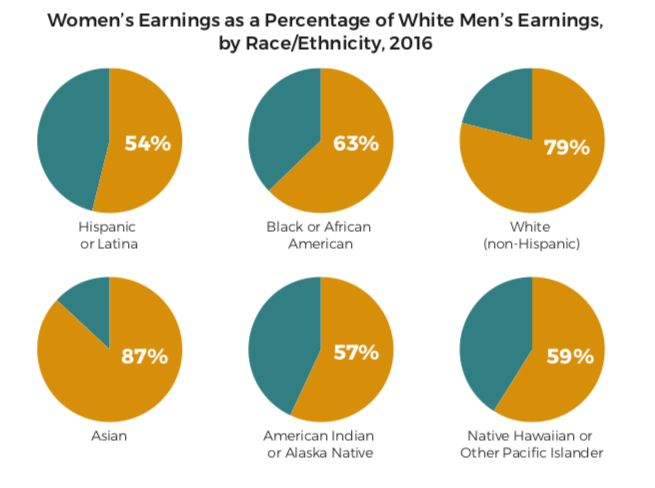Cultural differences don’t play a role in gender wage inequality, but the reasons behind a career break do vary from country to country. German women are stuck in a conservative mindset, American children start school when they turn 5, while in France, families find support through a generous tax incentive program and daycare centers.
Soon after Emmanuel Macron was elected president in France, he tried to give an official status to his wife, or more generally to French presidents‘ spouses. But, after 280,000 people signed a petition, he backed down. “What is your problem?“ I remember thinking. “First ladies have to give up their careers and take on the ungrateful task of making their husbands look good, and their are denied an official status with pay? Guys, it’s 2018!!“
During the 3-day official state visit from President Macron last week, his wife Brigitte was always present. She was there for the arrival at the White House, the visit to the Lincoln Memorial and Arlington Cemetery, the planting of a sapling in the White House garden, the dinner at Mount Vernon, the medals ceremony at the French Embassy, the official state dinner, the town hall meeting at George Washington University, the address to Congress, etc : Brigitte Macron stands by her husband’s side day after day.
When he was late for his speech at the embassy, she just came over, smiling, and asked us to wait 10 more minutes because “he is worth it.” When she showed off, the crowd wanted to applaud. Immediately, she raised her hands asking us to stop. She’s gracious and modest.
The French first lady has a 24/7 job but gets no salary.
Surprisingly, I found out that the American first lady isn’t paid either.
Cultural differences don’t play a role in gender wage inequality
Wage inequality exists in Europe as well as in the US. According to 2016 OECD’s stats, the gender wage gap (or the difference between median earnings of men and women relative to median earnings of men) varies between 10% in France, 15% in Germany, and 18% in the United States.
But the facts behind the wage gap differ from country to country. School hours and tax credits play a role, as does the national mindset.
Wage inequality in Germany
German women like to take a one- to three-year break after giving birth. One reason is certainly the generous German maternity leave (check out my article about Maternity Leave in Germany here), but also because they have the right to return to their previous jobs up to three years after giving birth!
That still doesn’t explain why they seek part-time jobs when they go back to work. Traditionally, the German school day starts at 8:00 a.m. and finishes midday. German mums want to be home when their children get home from school. According to the OECD, 37.5% of German women work part-time, a figure well above the OECD average of 25%.
(If you want to know more about the German school system, I recommend this extensive article from the German Way)
Besides this logistical aspect, the mindset in Germany is extremely focused on the child. When I was pregnant with my first child and announced that I would come back to work six months after the baby’s birth, many colleagues argued that this was very bad for my child‘s development. I’ll never forget the day a colleague warned me: “Ms. Rochereul, don’t you know that children who aren’t raised by their mothers all become criminals?!”
Wage inequality in France
With a gender wage gap of 9.9%, France ranks below the OECD average (14.1%). There are tax credits for families employing a certified nanny and daycare centers are open 11 hours a day for babies as young as 2.5 months. France has an excellent childcare system, mostly funded by the government.
But it’s not good enough for the government.
In March 2018, the French Prime Minister announced plans for closing the country’s wage gap. Thirty-five years after the introduction of a law requiring equal pay for the same work, the government wants to give companies three years to close the gap or they will face fines.
Wage inequality in the United States
According to the AAUU, “Most women of color are paid substantially less than white women, who in turn are paid less than white men.” The following figures certainly support the statement.

Motherhood and school enrollment at 5 play strongly in the wage gap. Who takes care of them before? Who can afford a daycare if no relatives are around to lend a hand? Sometimes, it’s simply cheaper to take care of the family than to pay for a nanny or daycare center. According to think tank PEW Research Center, “roughly four-in-ten mothers said that at some point in their work life, they had taken a significant amount of time off (39%) or reduced their work hours (42%) to care for a child or other family member.”
Want to fix wage inequality? Start with the first ladies!
In a Money article from 2016, President Obama noted that there’s no equal pay in the White House, as first ladies get paid nothing. When he got elected, “Michelle Obama gave up her $212,000 salary as a hospital executive.”
Brigitte Macron or Melania Trump weren’t elected by the people; their husbands were. Despite all of their work, they cannot be appointed by their husbands because that would be called nepotism. But if a first lady were to get paid for the job, how much would it be worth?
To answer that question, Money reached out to experts in their field. Salary.com arrived at a salary of $173,000. An executive outplacement firm calculated that the job is worth $287,000.
In my humble opinion, that doesn’t even sound like that much considering that it’s a nonstop job.



“In France and Germany, do you think women who are mothers are discriminated against in the hiring process? Are employers less likely to hire a woman because she already has children?” “Do mothers take more time off from work (to care for their children when they are sick or schools are closed) than do women without children (who may take off from work for other reasons)? ” Your article on wage inequality evoked those questions in my mind.
Good questions Margaret. I do not know stats about working women with or without children, but German parents are entitled to take 5 paid day-off per year when their child is sick and must stay home. In real life, mothers do it if necessary. Personally I never met or heard of a father doing it.
Another thing: Germans write marital status and number of children in their resume… some managers certainly think about the potential absenteeism of working mothers.
For my part, I’ve hired many people during my career and it never played a important role in my decision. Thinking if the risk yes, but if the candidate had all skills required, I hired her nonetheless.